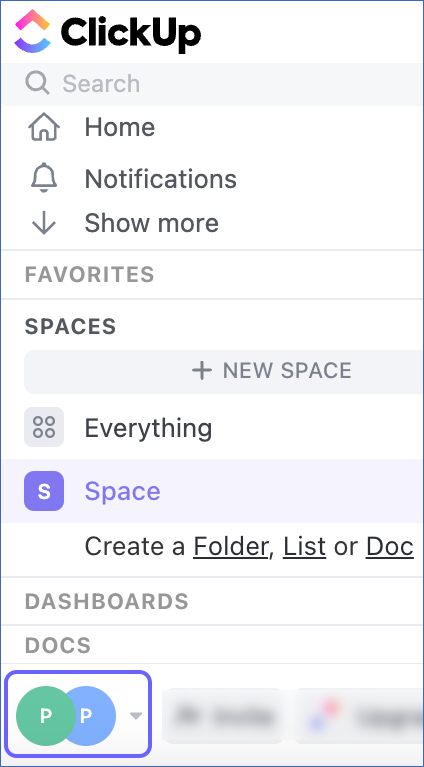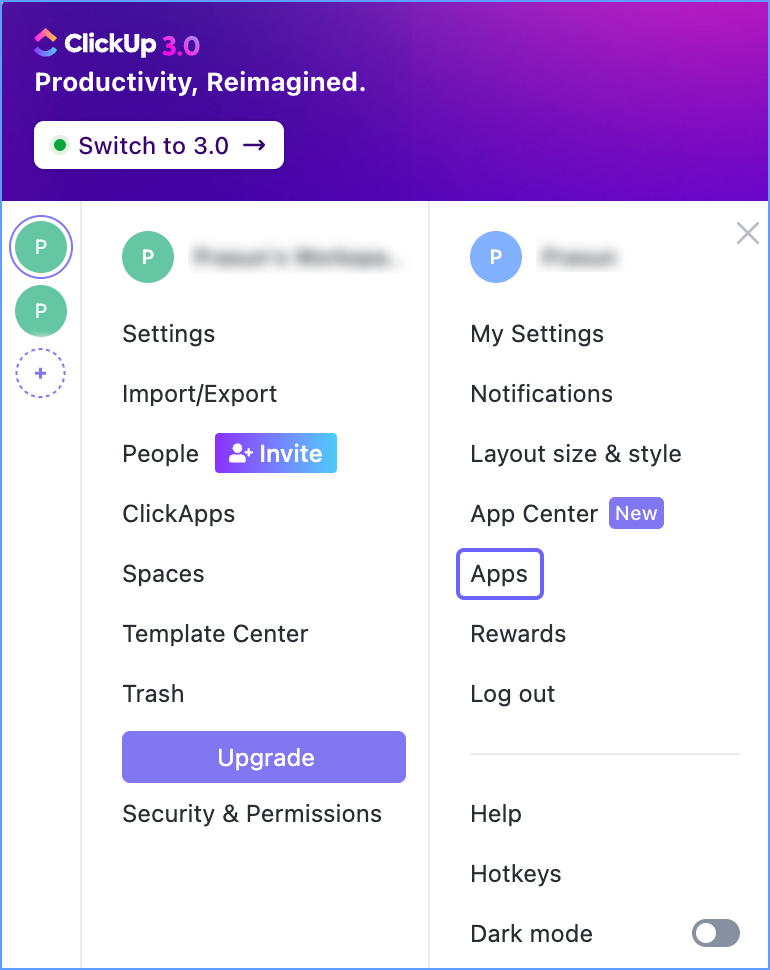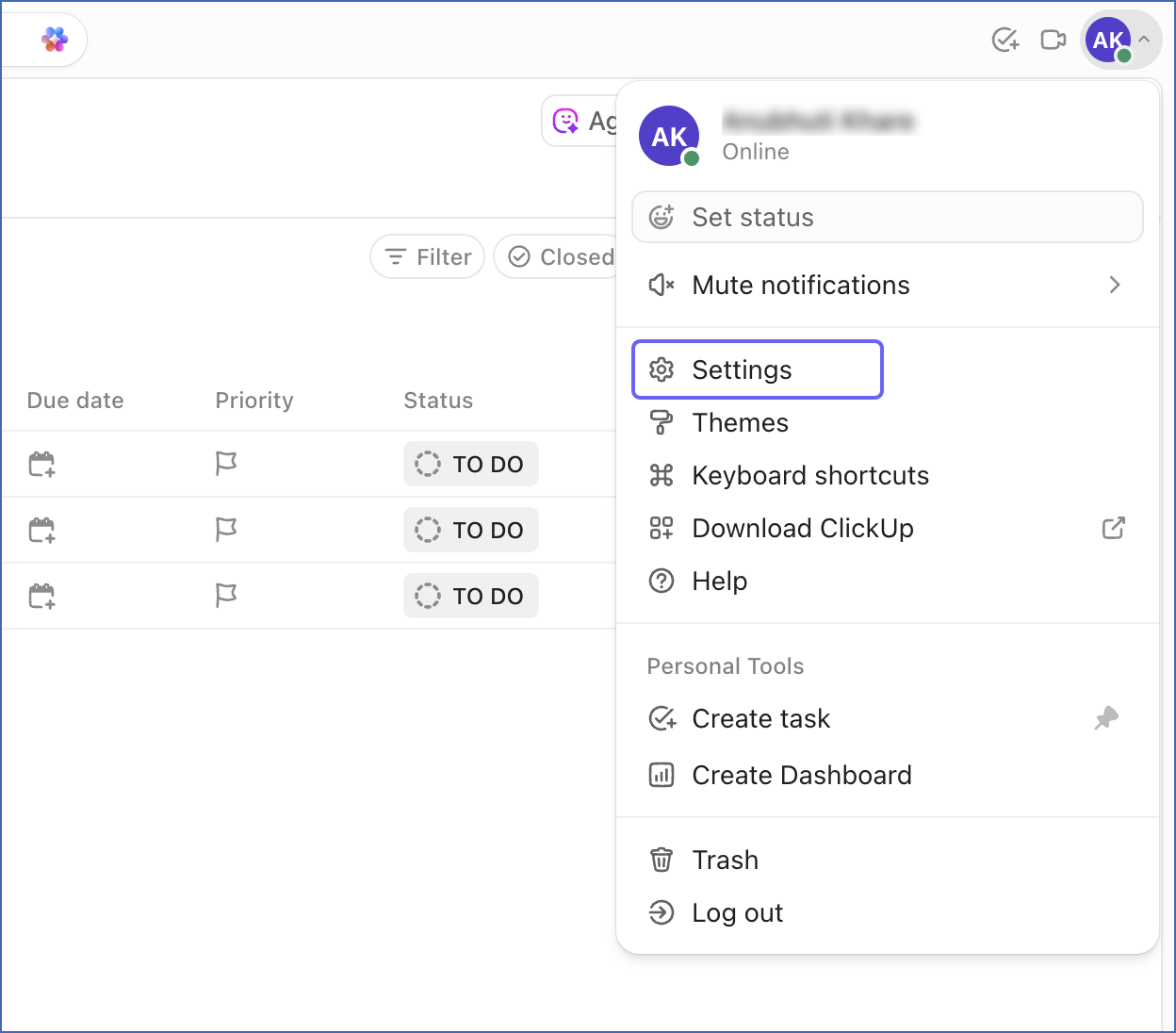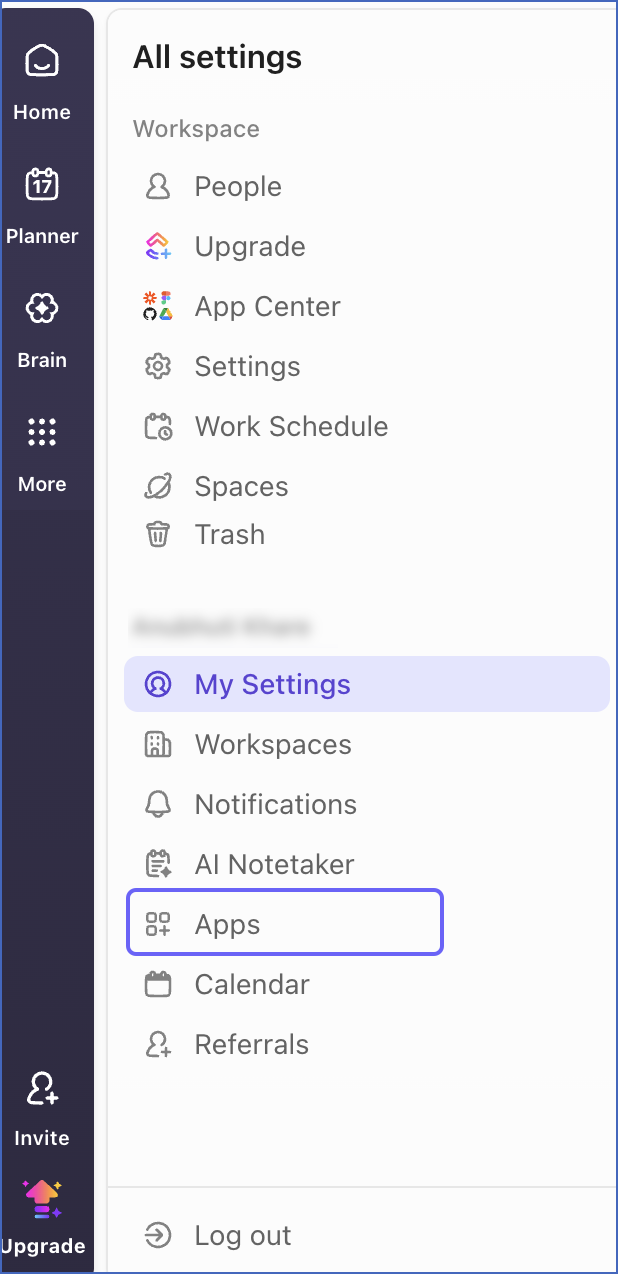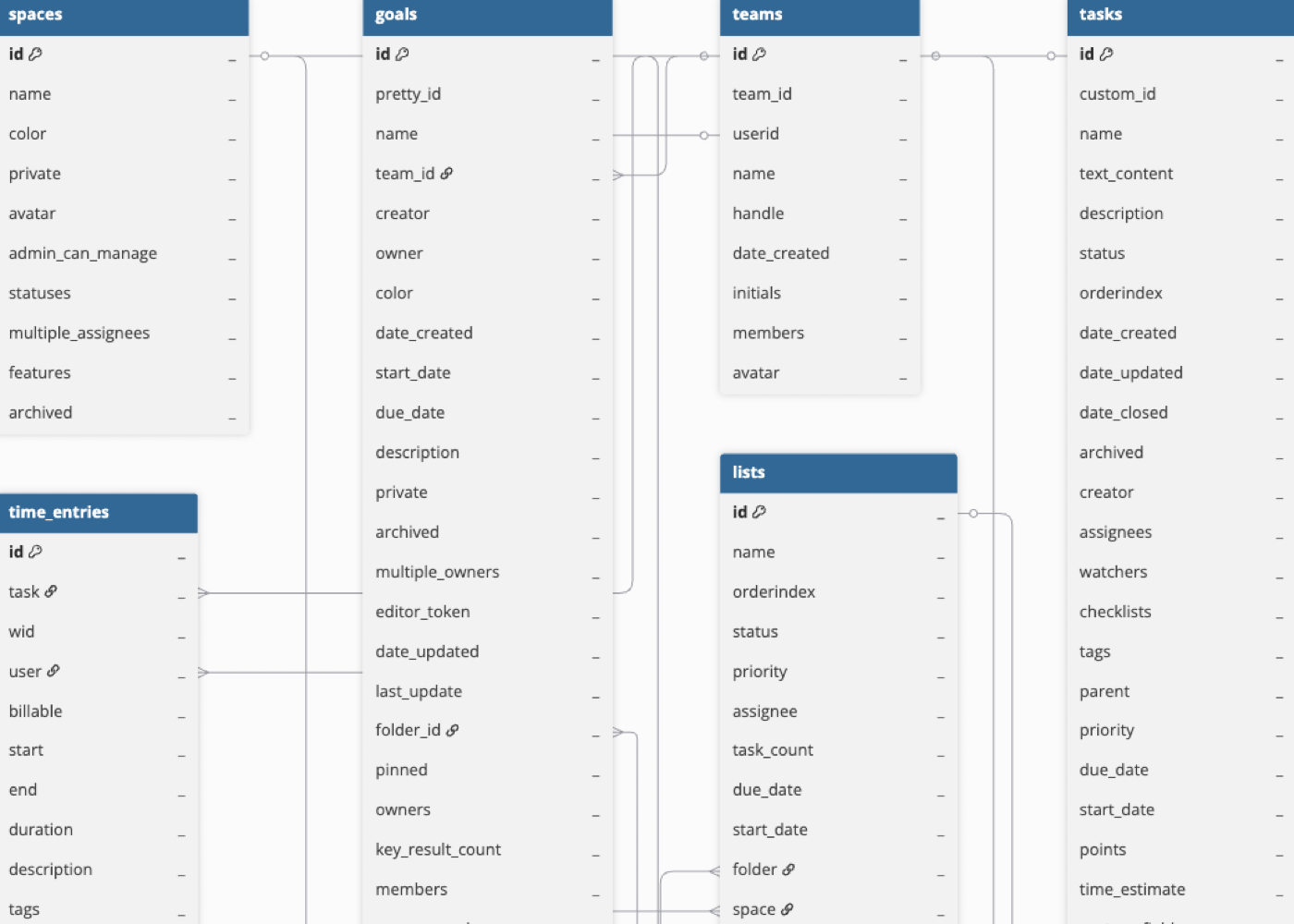ClickUp is a SaaS-based project management and collaboration tool that allows businesses to manage their projects. You can use this tool for communication, collaboration, task assignments and statuses, alerts, and detail progress towards completion. You can customize alerts and create custom workflows for your projects according to your requirements.
Hevo uses the ClickUp API to ingest data from your ClickUp account and load it to the desired Destination for scalable analysis.
Prerequisites
Obtaining the Workspace ID and API Token
You require a workspace ID and an API token to authenticate Hevo on your ClickUp account.
Note: You must log in as an Admin user or an Account Owner to perform these steps.
Obtaining the Workspace ID
Perform the following steps to obtain your workspace ID:
-
Log in to your ClickUp account, and click Home.

-
Copy the workspace ID from the URL path of the ClickUp home page and save it securely like any other password. For example, if the URL path is https://app.clickup.com/12345678/home, the workspace ID is 12345678. Use this ID while configuring your Hevo Pipeline.
Obtaining the API Token
ClickUp currently supports two user interface (UI) versions, 2.0 and 3.0. Although the API token you generate remains the same, the steps to obtain it differ based on your UI version.
To obtain this API token:
-
Log in to your ClickUp account.
-
Identify your ClickUp UI version:
-
If your profile icon is visible at the bottom left corner of the page, you are on version 2.0.
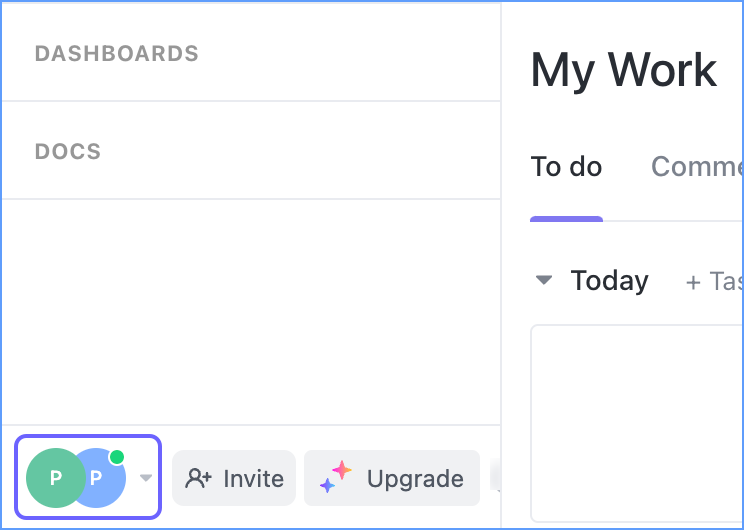
-
If your profile icon is visible at the top right corner of the page, you are on version 3.0.
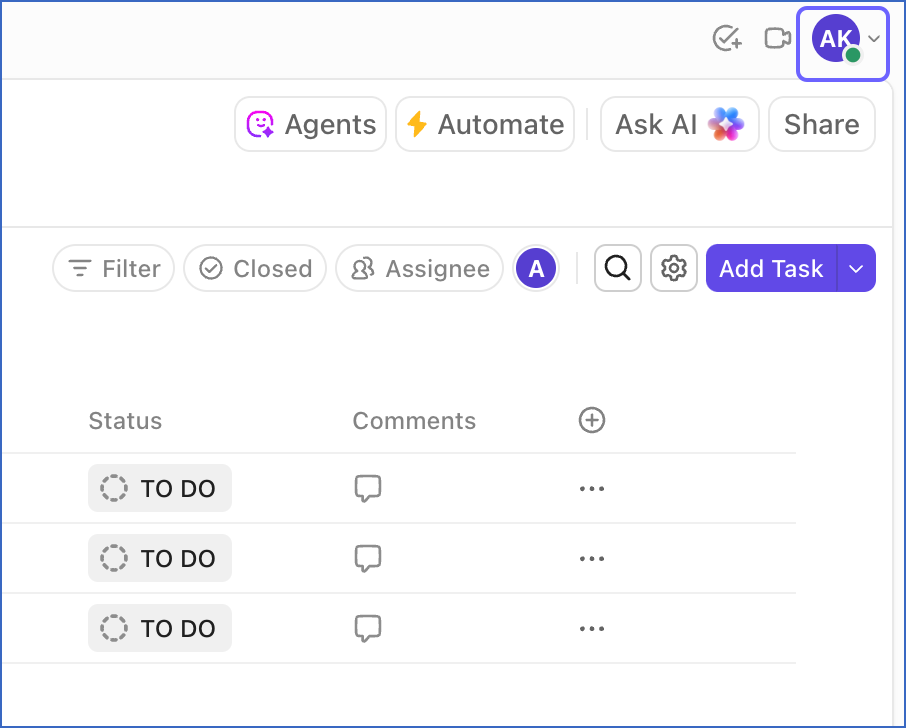
-
Depending on your ClickUp UI version, do one of the following:
-
On the page that appears, under API Token section, click Generate.

-
Click Copy corresponding to the API token to copy it, and save it securely like any other password. Use this token while configuring your Hevo Pipeline.

Configuring ClickUp as a Source
Perform the following steps to configure ClickUp as the Source in your Pipeline:
-
Click PIPELINES in the Navigation Bar.
-
Click + Create Pipeline in the Pipelines List View.
-
On the Select Source Type page, select ClickUp.
-
On the Select Destination Type page, select the type of Destination you want to use.
-
On the Configure your ClickUp Source page, specify the following:
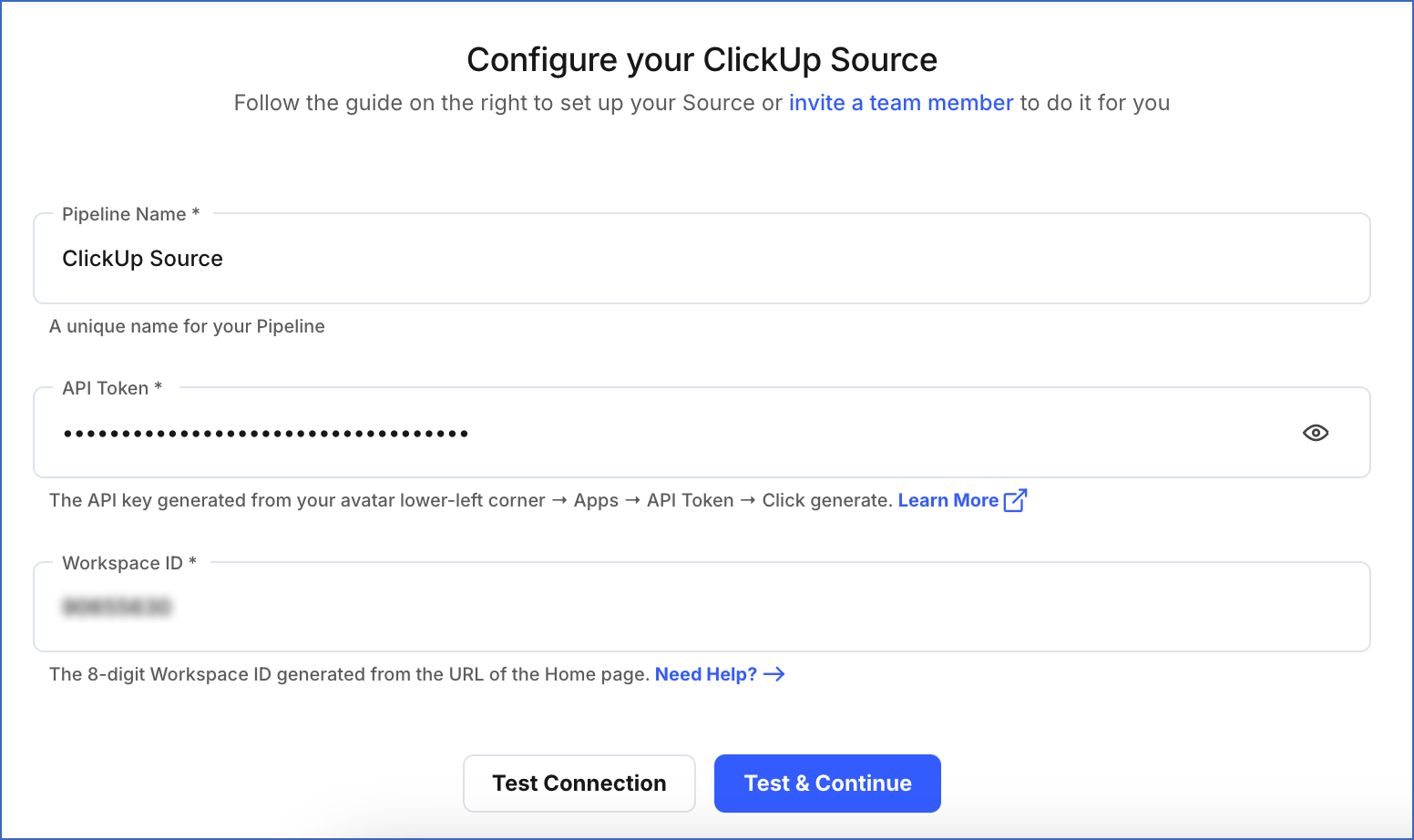
-
Pipeline Name: A unique name for the Pipeline, not exceeding 255 characters.
-
API Token: The API token that you generated in your ClickUp account to allow Hevo to access your data.
-
Workspace ID: The ID of the workspace from which data is to be ingested.
-
Click Test & Continue.
-
Proceed to configuring the data ingestion and setting up the Destination.
Data Replication
| For Teams Created |
Default Ingestion Frequency |
Minimum Ingestion Frequency |
Maximum Ingestion Frequency |
Custom Frequency Range (in Hrs) |
| Before Release 2.21 |
1 hr |
1 hr |
24 hrs |
1-24 |
| After Release 2.21 |
6 Hrs |
30 Mins |
24 Hrs |
1-24 |
Note: The custom frequency must be set in hours as an integer value. For example, 1, 2, or 3, but not 1.5 or 1.75.
-
Historical Data: In the first run of the Pipeline, Hevo ingests all the existing data for the selected objects from your ClickUp account and loads it to the Destination.
-
Incremental Data: Once the historical load is complete, all new and updated records for the Tasks object are ingested as per the ingestion frequency. The remaining objects are ingested in Full Load mode.
Schema and Primary Keys
Hevo uses the following schema to upload the records in the Destination database. For a detailed view of the objects, fields, and relationships, click the ERD.
Data Model
The following is the list of tables (objects) that are created at the Destination when you run the Pipeline:
Note: The Teams object is available only for the paid users of ClickUp.
| Object |
Mode |
Description |
| Spaces |
Full Load |
Contains the list of all the groups created in the ClickUp workspace within the organization, to organize the teams and projects. For example, a Marketing space used by the marketing team to manage all their projects. |
| Goals |
Full Load |
Contains the details of the objectives broken down into smaller, measurable targets that have to be completed to accomplish the goal. |
| Teams |
Full Load |
Contains the details of all the user groups in a workspace. |
| Tasks |
Incremental |
Contains the details of all the tasks assigned to users. |
| Time Entries |
Full Load |
Contains the details of the time tracked by users for a particular task. |
| Folders |
Full Load |
Contains the details about the folders that contain tasks categorized into different groups (lists) related to projects. |
| Lists |
Full Load |
Contains the details of all the various task groups in a folder. |
| Folderless Lists |
Full Load |
Contains the details of the groups of tasks which are not inside a folder. |
Read the detailed Hevo documentation for the following related topics:
Source Considerations
-
Rate Limit: ClickUp imposes a limit on the number of API calls within a specific time interval per token. These rate limits are based on your ClickUp Workspace plan. Read Rate Limits to know more about rate limits in ClickUp.
Limitations
-
Hevo currently does not support deletes. Therefore, any data deleted in the Source may continue to exist in the Destination.
-
Hevo does not load data from a column into the Destination table if its size exceeds 16 MB, and skips the Event if it exceeds 40 MB. If the Event contains a column larger than 16 MB, Hevo attempts to load the Event after dropping that column’s data. However, if the Event size still exceeds 40 MB, then the Event is also dropped. As a result, you may see discrepancies between your Source and Destination data. To avoid such a scenario, ensure that each Event contains less than 40 MB of data.
Revision History
Refer to the following table for the list of key updates made to this page:
| Date |
Release |
Description of Change |
| Nov-11-2025 |
NA |
Updated the document as per the latest Hevo UI. |
| Sep-18-2025 |
NA |
Updated section, Configuring ClickUp as a Source as per the latest UI. |
| Sep-17-2025 |
NA |
Updated section, Obtaining the API Token as per the latest ClickUp UI. |
| Jul-07-2025 |
NA |
Updated the Limitations section to inform about the max record and column size in an Event. |
| Jan-07-2025 |
NA |
Updated the Limitations section to add information on Event size. |
| Nov-05-2024 |
NA |
Updated sub-section, Obtaining the API Token as per the latest ClickUp UI. |
| Mar-05-2024 |
2.21 |
Updated the ingestion frequency table in the Data Replication section. |
| Oct-03-2023 |
NA |
Updated section, Obtaining the API Token to reflect the latest ClickUp UI. |
| Nov-23-2022 |
2.02 |
New document. |



